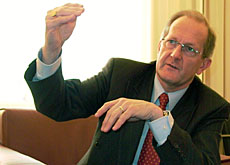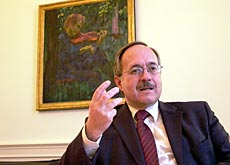Deiss says consensus government still working

The outgoing Swiss president, Joseph Deiss, says the government is working well as a team, despite political differences.
Deiss held the largely ceremonial post during a year in which the controversial rightwing politician Christoph Blocher joined the cabinet and Switzerland signed new bilateral agreements with the European Union.
The year was marked by much debate about whether Switzerland’s power-sharing government could be effective with a figure like Blocher in the cabinet.
Blocher has made little secret of his opposition to many government policies, including closer ties with the EU, and his party has already said it will force a nationwide vote next year on the Schengen/Dublin accord concerning cooperation on cross-border crime and asylum.
swissinfo: How would you sum up 2004 for Switzerland – good, bad, indifferent?
Joseph Deiss: Overall, I would say it was a good year. From an economic point of view, it was the first in a long time that saw growth of nearly two per cent.
However, not everything is as it should be. We are very strong on the export front, but rather less so on the domestic demand front. And the position is even worse if we look at unemployment, where we are in a period of stagnation at best.
Politically, it was also an important year. We had the elections last year, and a new government and parliament. As a result, everyone involved had to find a new equilibrium, a new “road map”.
As far as the government goes, I think it took us some months to “find ourselves”, but we are now working quite well, engaged in discussions which – while often very competitive – result in solutions being found.
swissinfo: On that note, there has been much talk recently about the principle of collegiality being undermined. What is your view?
J.D.: I think the debate outside the government was often a distortion of what actually happened inside. It is clear that if you have strong personalities with firm political positions, debates on key issues will be tough.
But, on the human level, I would say we have a very good climate and are able to work efficiently. We had discussions within the government, about collegiality, about consensus – and about how to deal with the media. But we have also been dealing with important substantive issues, leading productive debates and making good decisions.
swissinfo: What were the key developments of the year?
J.D.: On the international level, quite definitely the new agreements with the European Union and the extension of the EU to the east. Internally, I would highlight the transition to the new government and parliament. I think things are now working well, but it was certainly not the easiest of exercises.
From the national political perspective, there were several important and positive developments – for instance, reform of the federal financing system and the introduction of maternity leave legislation.
Regarding public spending, we are now on a clear path towards the elimination of structural deficits. Finally, as economics minister, it was very important for me to have clear support for my growth programme.
swissinfo: What are the main political lessons you would draw from 2004?
J.D.: For me, one important lesson is that our country can only function properly if we continue to seek consensual solutions. A competitive government system could not be sustained in a direct democracy in the longer term. In order to find solutions that satisfy the majority of people, all major political forces have to be integrated.
swissinfo: And economic lessons?
J.D.: We are back on the growth path, but we will have to work hard for even better results. Our country needs some major long-term reforms, rather than quick fixes. I hope I have at least been able to change the nature of the debate in this respect.
Whether we are working on education, on research, on competition, on balancing the budget or on the EU, it will take time for results to be visible.
swissinfo: As president and economics minister, you visited several key foreign markets, from Japan to Mexico. How would you sum up the success of these trips?
J.D.: The post of president is held for only one year, but I had the good fortune to take over this task after four years as foreign minister and after one year of being in charge of external economic relations.
This means I already knew a fair amount of the key players, and could use the office of president to open doors that a mere minister might have more difficulty opening.
swissinfo: How do you perceive the image of Switzerland abroad?
J.D.: I think it is generally excellent. Sometimes, I myself do not have such an idealised view. For instance, a good Indian film that ends happily is almost obliged to do so on a Swiss mountaintop.
The number of people who say that a part of their country considers itself to be in some sense “the Switzerland of Asia” or wherever is also very flattering. Obviously, this view ignores the many everyday problems we also have to deal with.
swissinfo: What will be the main problems Switzerland has to deal with in 2005?
J.D.: We will have some major debates in this country next year. One will be on a series of bilateral agreements with the EU involving very sensitive issues.
On the internal level, I consider it important to make progress with my growth programme. We will have very important debates on reform of internal markets and public procurement, but also on other difficult questions – for instance agricultural policy for 2007 to 2011 and on financial support for the less prosperous regions of Switzerland.
swissinfo: Regarding Europe, what will the government have to do to win public support for the Schengen-Dublin accord and the free movement of people?
J.D.: I think the most important thing will be to show that we are ourselves convinced that this is the best course to take for our country. We are going to explain this to the people and in this way succeed in overcoming populist scare tactics.
swissinfo–interview: Chris Lewis and Marcela Águila Rubín
Deiss, an economics professor, is the sole remaining government representative of the centre-right Christian Democratic Party.
He served four years as foreign minister before moving to the economics ministry in 2003.
In 2004 he assumed the presidency earlier than planned, after party colleague Ruth Metzler failed to be re-elected to government.
Deiss says 2004 was a good year for Switzerland, despite “stagnation” on the unemployment front and several unresolved “structural” problems.
Highlights included resumed economic growth and the signing of new bilateral agreements with the EU.
Deiss says the new federal government is now working well together, following some initial hitches.

In compliance with the JTI standards
More: SWI swissinfo.ch certified by the Journalism Trust Initiative


You can find an overview of ongoing debates with our journalists here . Please join us!
If you want to start a conversation about a topic raised in this article or want to report factual errors, email us at english@swissinfo.ch.